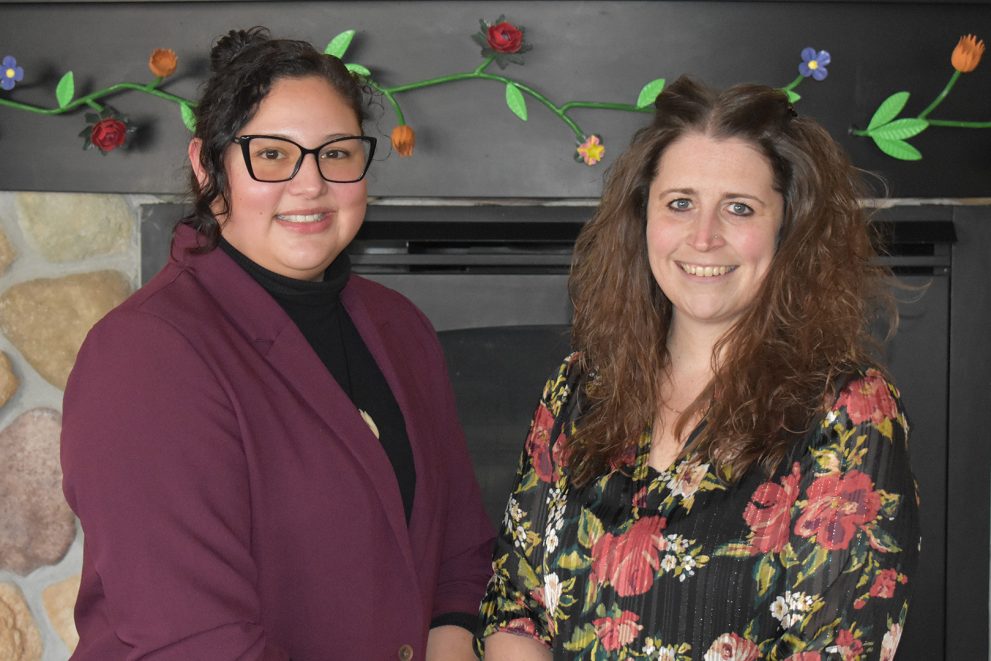
Bemidji State University’s innovative Indigenous sustainability studies program has new leadership. Ann Humphrey, who has been on the staff at BSU’s American Indian Resource Center since 2018, has taken over as faculty lead for the program this spring.
BSU launched the program, which offers students a unique opportunity to explore environmental sustainability issues through an Indigenous perspective, with a minor in the fall of 2018. A bachelor of science degree option was added in the fall of 2019.
Supported at launch by a $600,000 grant, the program has been called Niizhoo-Gwayakochigewin for an Ojibwe phrase meaning “two ways of doing the right thing in the right way.” The program, which has few peers in North America, combines Bemidji State’s strengths in environmental education and advocacy with its long history of support for Indigenous communities and ways of knowing and being.
A combination of factors, including a faculty departure and the program’s applications for continued grant funding, led Dr. Jeff Bell, dean of BSU’s College of Sciences and Health, to assemble a group of faculty to explore how to make the program more student-friendly. The group, which included Humphrey; Dr. Anna Carlson, associate professor of environmental studies; Dr. Hillary Barron, assistant professor of biology; and a group of other faculty from BSU’s School of Sustainability & Life Sciences began a collaborative effort to redesign the curriculum.
Needing a faculty member to lead the program, Bell approached Humphrey — who said the choice was easy.
“I have a lot of lived experience in sustainability studies and, specifically, Indigenous sustainability studies,” Humphrey said. “So it just clicked.”
Bell said Humphrey’s existing relationships with BSU students and her knowledge of the university and its services through her roles at the American Indian Resource Center made her an obvious choice to lead the program.
“I am excited to watch her weave together her student success focus, passion for traditional ecological knowledge and her understanding of curriculum design,” Bell said. “Her connections with the local Ojibwe communities will bring knowledgeable people to our students, and I am excited she wants to help bring more of that to our program.”
Humphrey said the program will introduce students to ways of viewing the three pillars of sustainability — environmental, social and economic — through an Indigenous lens, with strategies for drawing on Indigenous ways of knowing while navigating Western-traditional spaces.
“Overall, this major will continue to be a staple of Indigenous sovereignty, treaty rights policy and how we navigate the Western space,” Humphrey said. “So we will look at the three pillars of sustainability on the entry level, and then go deeper and move into more focused projects.”
“I’m excited about the courses I’ll be teaching,” she added. “The courses will have clear intent about the fall season and the spring season, and the activities that Ojibwe people traditionally do during those seasons.”
The Niizhoo-Gwayakochigewin program has included a summer internship program, which in the past has focused on providing opportunities for tribal college students to engage in service and sustainability projects before starting their fall coursework. It’s a key component of the program that Humphrey aims to retain.
“The internships are going to be baked into the plan of what students need to take for the major,” Humphrey said. “There are all kinds of cool ideas we’re coming up with for these internships that will speak to what our students have been asking for.”
The Niizhoo-Gwayakochigewin program started as a partnership between BSU’s Sustainability Office and its Indigenous studies and environmental studies programs. Humphrey sees similar collaborations as key to the program’s future, as well.
“There are a lot of faculty on campus who support Indigenous sovereignty, Indigenous ideas and Indigenous thought processes,” she said. “It’s exciting to be able to look at all of these different majors and minors, find ways that they fit alongside Indigenous sustainability studies in meaningful ways, and then use that to get students where they want to be in terms of a career outlook.”
Humphrey teaches three courses this semester: Sustainable Communities: Local Indigenous Perspective, Introduction to Turtle Island and Indigenous Environmental Current Events.
“Students can expect an experiential learning experience from a faculty member who grew up learning from her family about the natural environments of this special place in the woods and on the waters of Northern Minnesota,” Bell said.
Bell says that Niizhoo-Gwayakochigewin’s unique characteristics empower students to understand sustainability issues from multiple perspectives that no other program can provide.
“My goal for this program is to grow the number of students who get to experience this truly one-of-a-kind course of study,” he said. “This program can set any student up for success because of the mutual understanding that arises from having multiple perspectives on sustainability.”
He sees the continued growth of this program as a crucial way for Bemidji State University to develop culturally aware and responsive graduates who will be adept at serving the communities in the university’s region and beyond.
“Knowledge coming from multiple ways of knowing sets a student up well for jobs that work with, for, or near tribal nations and peoples,” Bell said. “As we grow the experiential components of this program, it will be even more exciting for students to pursue — whether they do it as a standalone degree or in combination with other majors and minors.”
PRONUNCIATION: Niizhoo Gwayakochigewin (nee-zhoo gway-a-coach-ih-gay-win)
